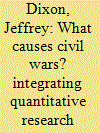| Srl | Item |
| 1 |
ID:
089015


|
|
|
|
|
| Publication |
2009.
|
| Summary/Abstract |
This study searches for consensus findings in the burgeoning statistical literature on civil war termination. Several trends are identified: the final outcomes of civil wars are largely dependent on the military situation; the duration of civil wars, by contrast, depends to a great degree on contextual factors such as inter-ethnic relations, the fragmentation of violence, and economic incentives; while compromise settlements reduce the risk of post-war massacres, they take longer to achieve than military victories and are more likely to collapse into renewed warfare. These results also suggest an intervener's dilemma: while external military intervention can lead to compromise and prevent genocide, it also prolongs the killing and may increase the risk of war recurrence. Interveners appear to have more success after wars than during them. Several other puzzles emerge from the statistical results, which call for theoretical development and further qualitative and quantitative analysis.
|
|
|
|
|
|
|
|
|
|
|
|
|
|
|
|
| 2 |
ID:
093001


|
|
|
|
|
| Publication |
2009.
|
| Summary/Abstract |
Over the past decade, dozens of quantitative studies on civil war onset have been published. This study compiles the results of 46 quantitative studies, and finds that of more than 200 hundred independent variables, there is some degree of consensus on the effects of fewer than 30 and a high degree of consensus on no more than seven. Furthermore, many puzzles and contradictions in the existing research literature have barely been examined. The review concludes that while there is embryonic consensus on the effects of a small set of variables, there is not yet a widely accepted theory that explains these effects. Since neither qualitative nor quantitative analysis of civil wars has solved these puzzles, future studies of civil war onset should theorize the expected interactions between all variables of interest, collect data on variables with poor proxies, take grievances more seriously in theory and measurement, make use of the enormous quantity of historical scholarship on civil wars, and extend the concept of "multiple paths to war" to intrastate war.
|
|
|
|
|
|
|
|
|
|
|
|
|
|
|
|